GIKEN LTD. (Head Office: Kochi-shi, Kochi; President and CEO: Atsushi Ohira) announced that the Implant™ Method has been adopted for the construction of river levees in the Delta Programme, a nationwide water management project being undertaken by the Netherlands government. Press-in technologies are steadily growing in adoption in Europe, with this being the next large-scale project in the Netherlands following the quay wall renovation project for the World Heritage-listed Canal Ring Area of Amsterdam, which commenced in 2022.
The Delta Programme is a large-scale national project to achieve sustainable flood control and a stable supply of fresh water against issues related to the water cycle—such as floods caused by climate change—that the Netherlands will be facing over the next few decades. Approximately 1,400 km of levees and 400 water gates and pump stations are planned to be reinforced across the Netherlands by 2050. This time, the rotary cutting press-in machine for tubular piles GYRO PILER™ and hydraulic pile press-in and extraction machine SILENT PILER™ will be used in the KIJK project, which is one of the Delta programs in order to reinforce existing river levees with combined walls formed using tubular piles and Z sheet piles. Construction will begin in September across a total length extending approximately 10 km.
Group company Giken Europe B.V. had provided assistance—in the form of technological proposals and formulation of construction plans—to the joint venture serving as the main contractor since the bidding stage. Giken Europe has already sold two units of SILENT PILER™ to the construction contractors, and going forwards, besides rental of GYRO PILER™, sale of ripping bits (ring bits) attached to the pile toes of tubular piles, and machinery repair and maintenance that comes with long periods of construction, the company will also provide continuous technical support.
The Delta Programme of the Netherlands is seen as a role model for water management in Europe in response to climate change. Based on the achievements of the construction this time, GIKEN will actively offer technological proposals towards expanding the adoption of constructions in countries around the world—including those in Europe—facing the risk of climate change by promoting the effectiveness and superiority of the company’s technologies and products.
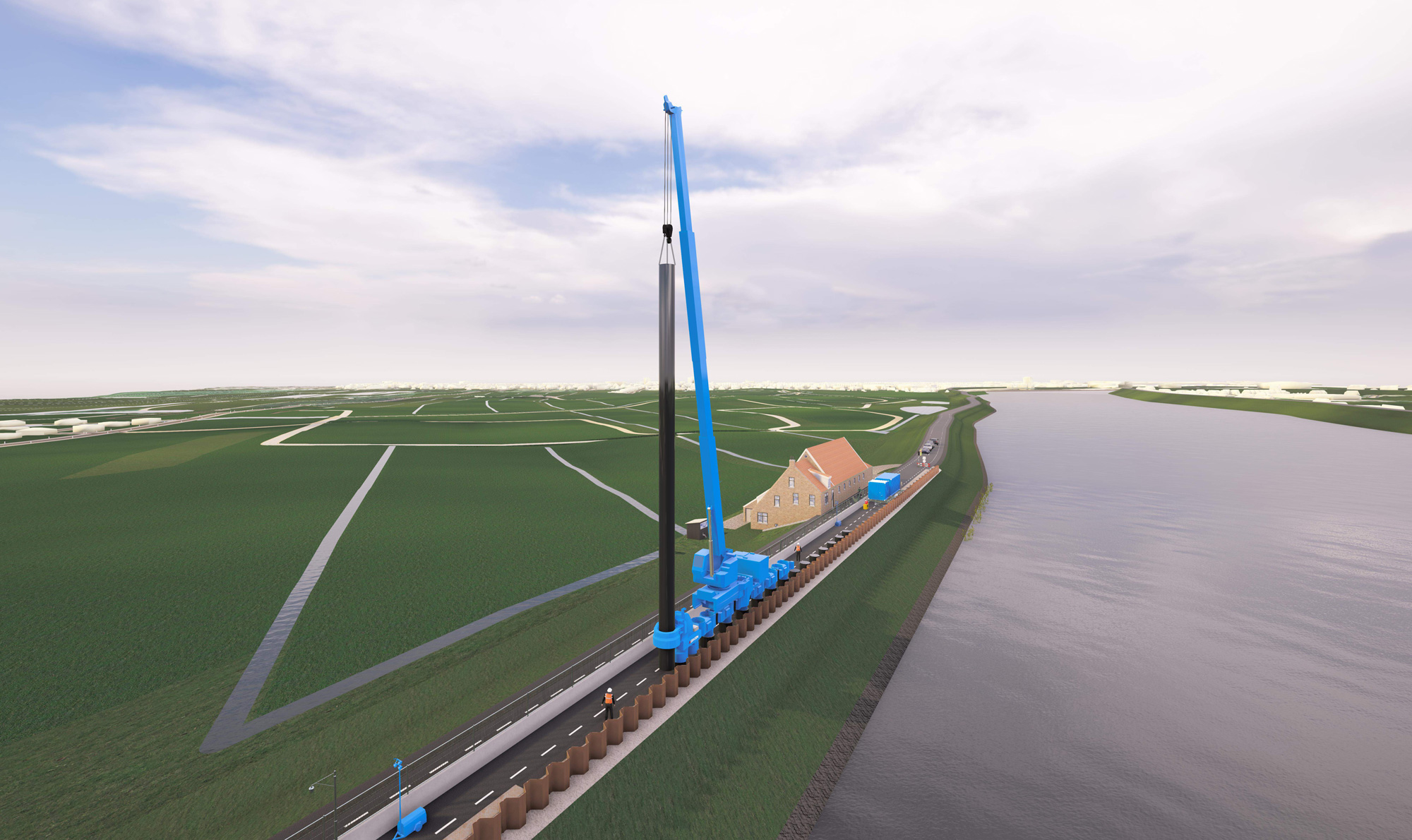
Concept of levee reinforcement using the Implant™ Method
■Delta Programme
The Delta Programme is a water management project being undertaken by the government of the Netherlands to protect the country against storm surges and floods. The project includes large-scale infrastructure construction. The lower part of the Netherlands is reclaimed by draining, and it is protected by water management facilities such as seawalls and levees, with 70% of the population residing in areas below sea level. Anticipating that climate change will bring about rising sea levels and an increase in flood flows, the Delta Act was formulated in 2012 for flood defence, water supply, and climate change adaptation. All measures in the Delta Programme are funded through the Delta Fund, a separate item in the budget of the national government. The Delta Fund is allocated an average of 1.25 billion euros (approximately 200 billion yen) each year until 2032.
■Overview of Construction Section (KIJK)
The construction section this time is one of the most complex sections in levee construction under the Delta Programme, particularly due to its challenges related to space, environment, logistics, and the surrounding residential areas. The site—which is along the Hollandse IJssel river in the province of Zuid Holland and full of residential areas—is intended to protect the lives and livelihoods of more than 200,000 people from flood damage. The existing levees are earthen embankments made by piling up soil. Press-in machines will be used to build combined walls—formed by tubular piles and Z sheet piles—within the earthen embarkments, the first such walls in Europe and an unprecedented construction even in Japan.
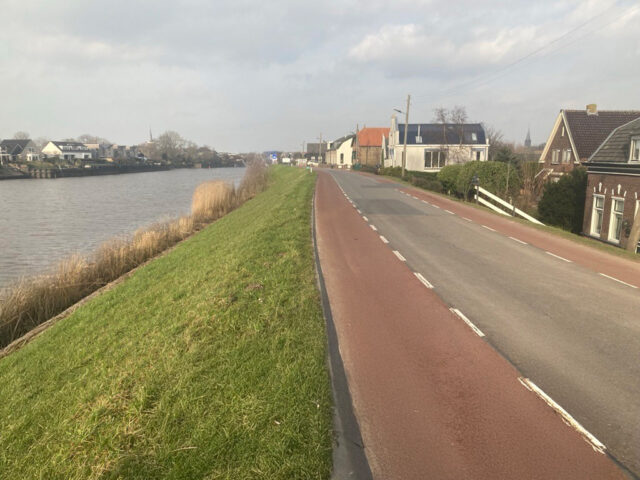
River levee lined by residences
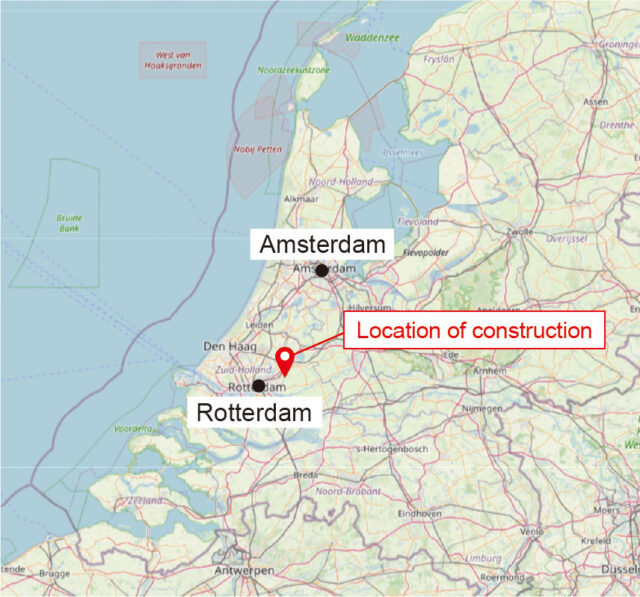
Location of construction
Source: OpenStreetMap
■Chronology of Adoption
The tender process adopted a comprehensive evaluation method, and innovation was required to be included in the proposal. Therefore, the joint venture KIGO—comprising Dutch construction companies Van Hattum en Blankevoort and Boskalis Nederland—built a partnership with Volker Staal en Funderingen, Gebr. De Koning B.V and Giken Europe while formulating construction plans.
Enabled by the products and construction methods of GIKEN, the proposal to reinforce and raise levees using combined walls that gave consideration to economy while minimising vibrations and noise to the surrounding environment and ensuring road traffic on the levees was highly evaluation as an innovation.
In 2023, the relevant parties of this project visited the press-in technology Information Transmission Base for Press-in Technologies “RED HILL 1967” located in Konan City, Kochi Prefecture, where they deepened their understanding of the construction method by seeing the actual objects, which helped to push for this adoption.
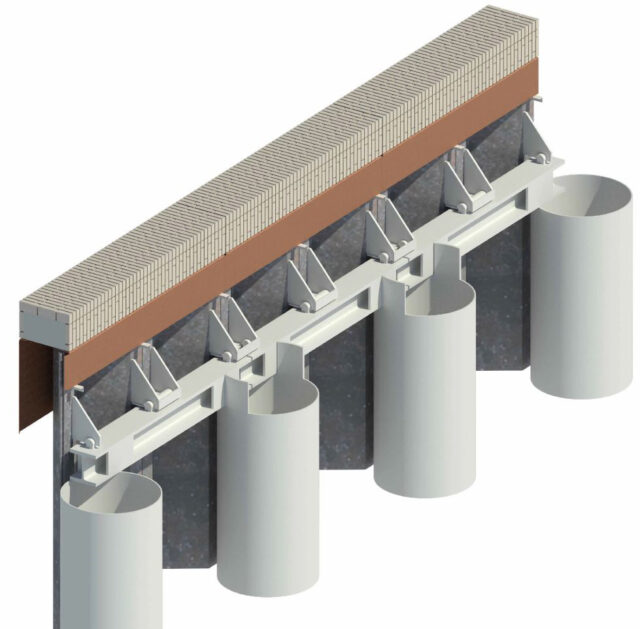
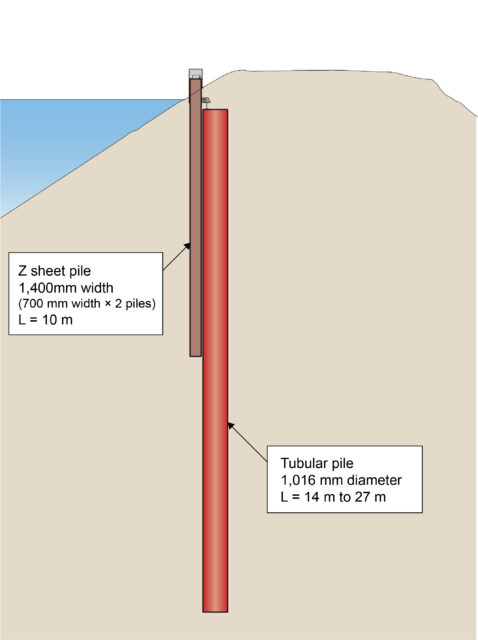
Created by GIKEN LTD. based on data provided by Volker Staal en Funderingen
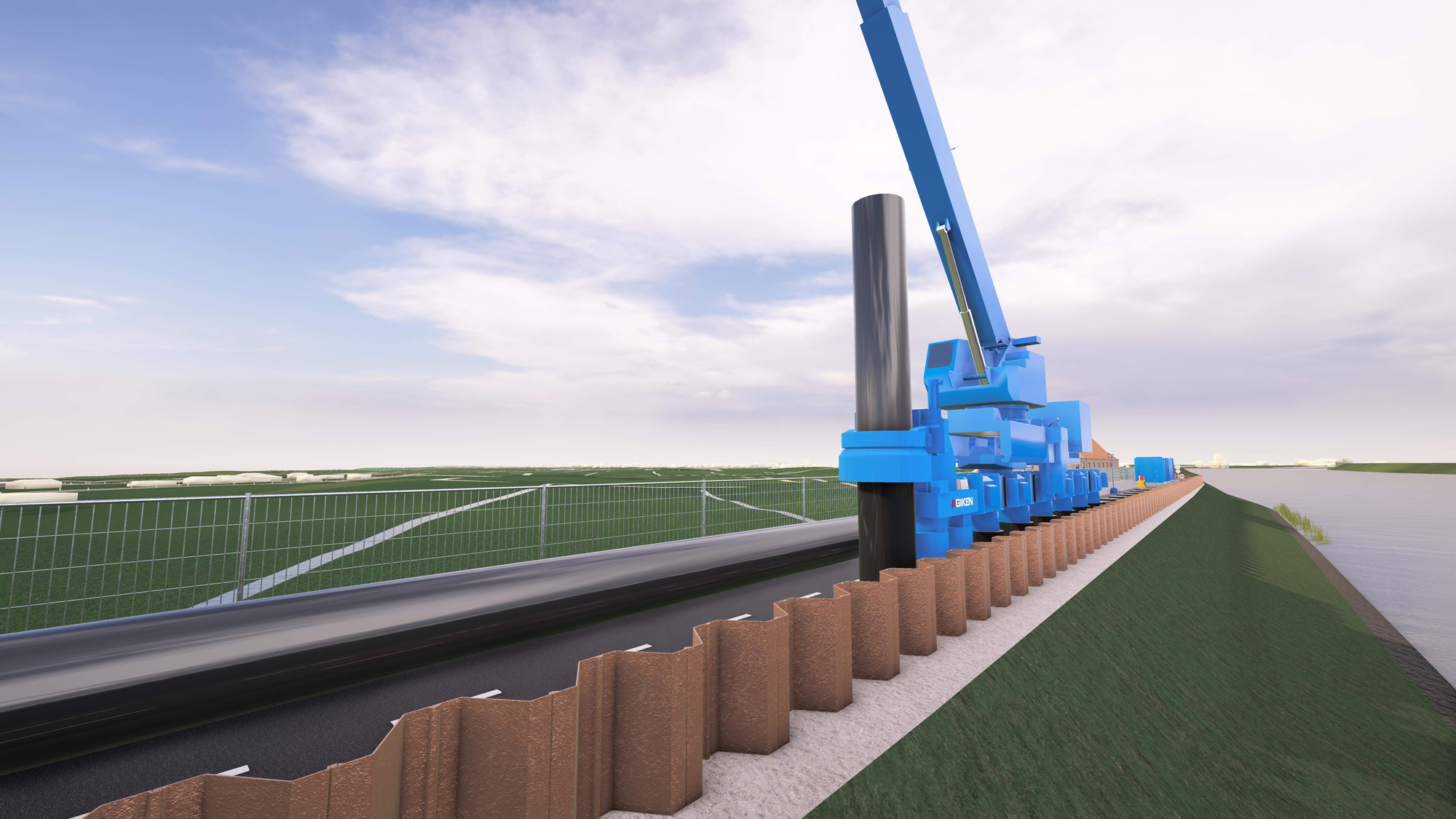
■Signing of Project Agreement at bauma 2025
From April 7 to 13, bauma 2025—the world’s largest trade fair for construction and heavy machinery—was held in Munich, Germany. At the booth of GIKEN, the agreement for this project was signed by the relevant parties.
At the exhibition, GIKEN showcased actual units such as SILENT PILER™ and GRB System™. Other activities included demonstrations of remote operation. A vibrant exchange of opinions about the project also took place, allowing renewed understanding about the superiority and potential of press-in technologies as well as further increasing the momentum towards the project’s success.
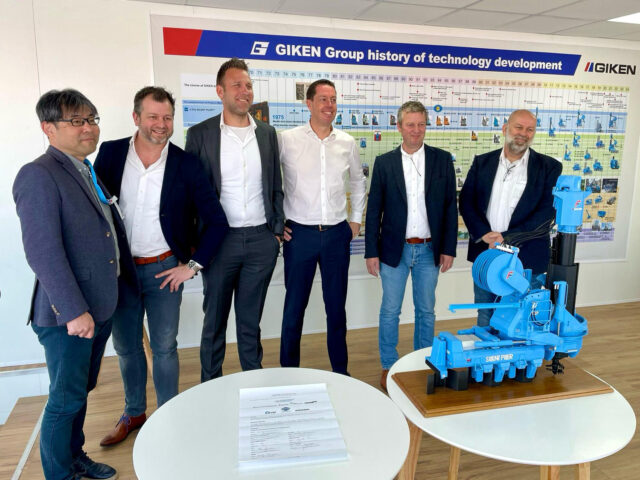
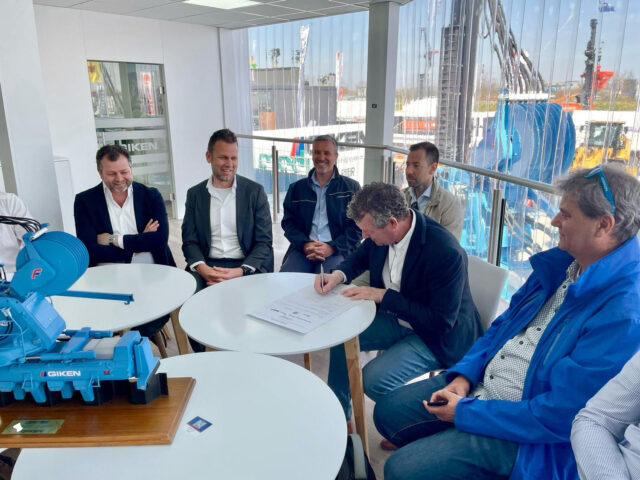
Signing ceremony held at the booth of GIKEN during bauma 2025
■Construction Overview
| Project Name | KIJK(Dijkversterking Krachtige IJsseldijken Krimpenerwaard) |
|---|---|
| Location | Krimpenerwaard between Krimpen aan den IJssel and Gouderak |
| Project Owner | Hoogheemraadschap van Schieland en de Krimpenerwaard (Schieland en de Krimpenerwaard regional water authority) |
| Main contractor | KIGO(joint venture between Van Hattum en Blankevoort and Boskalis Nederland) |
| Subcontractors | Volker Staal en Funderingen Gebr. De Koning B.V. |
| Equipment | [Tubular pile construction] GYRO PILER™ F401-G1200, Skiplock Attachment, and CLAMP CRANE™ CB4-2 [Steel sheet pile construction] SILENT PILER™ F401-1400 and CLAMP CRANE™ CB3-6 |
| Specification of Pile Elements | Approximately 2,500 tubular piles of 1,016 mm diameter and 14 m to 27 m length Approximately 4,500 pairs of Z sheet piles of 1400 mm width (AZ24-700×2piles) and 10 m length |
| Press-in Construction Period | From September 2025 |
■Profile of GIKEN Group
GIKEN developed the SILENT PILER™, the world’s first reaction-based, non-vibratory hydraulic pile driving machine that operates with minimal noise impacts. The GIKEN Group now actively promotes its press-in technology worldwide and contributes to the construction industry by proposing and implementing innovative solutions. The innovative press-in technology provides a unique solution and the adoption of this technology has spread to over 40 nations and regions.
Contact Us


